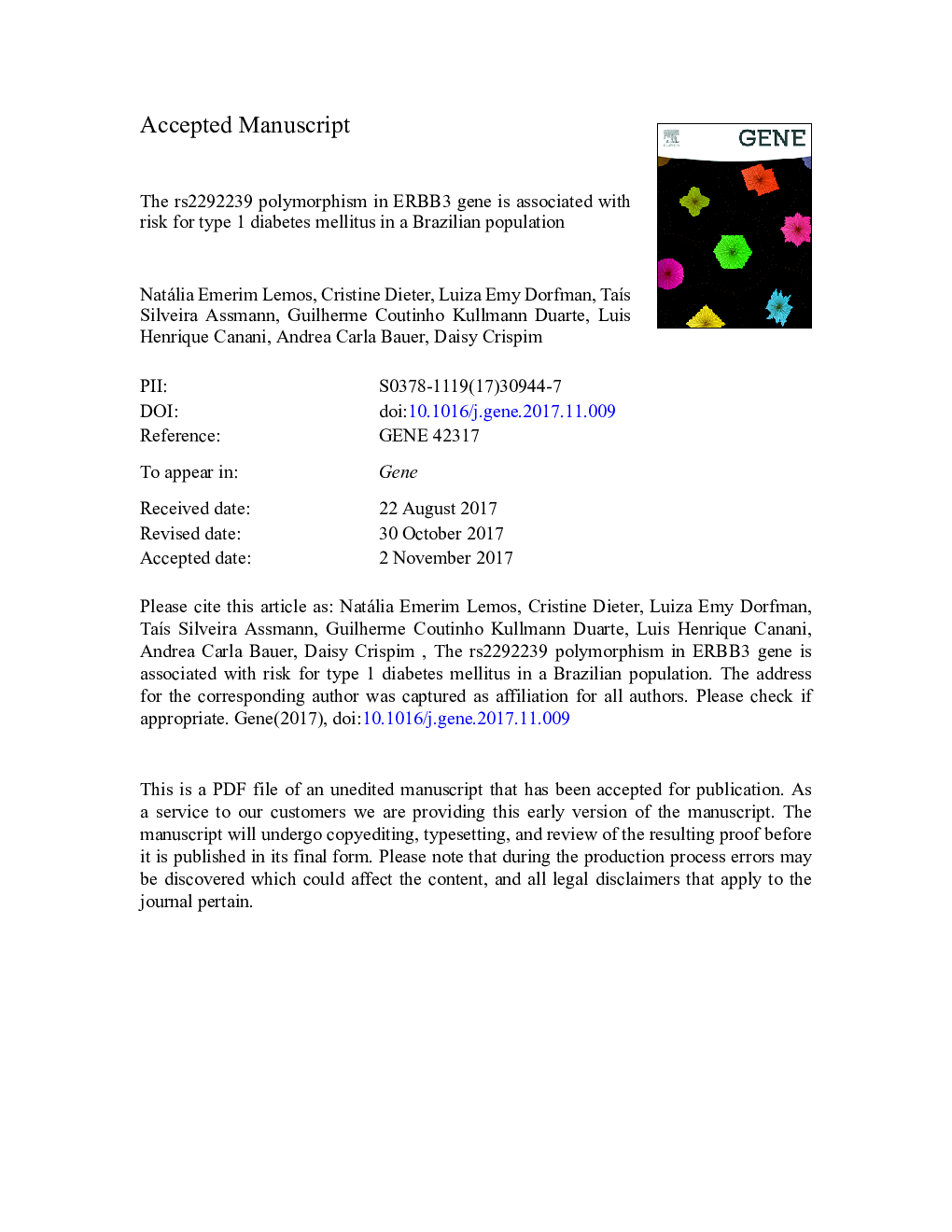| Article ID | Journal | Published Year | Pages | File Type |
|---|---|---|---|---|
| 8645768 | Gene | 2018 | 27 Pages |
Abstract
The Erb-b2 receptor tyrosine kinase 3 (ERBB3) belongs to a family of epidermal growth factor receptors of protein tyrosine kinases, and regulates cell survival, differentiation and proliferation in several cell types. Previous studies have suggested that ERBB3 contributes to T1DM pathogenesis by modulating antigen presenting cell function, autoimmunity and cytokine-induced beta-cell apoptosis. Accordingly, some genome-wide association studies identified ERBB3 gene as a susceptibility locus for T1DM, with the strongest association signal being observed for the rs2292239 single nucleotide polymorphism (SNP) in intron 7 of the gene. Therefore, the aim of the present study was to replicate the association of the ERBB3 rs2292239 SNP with T1DM in a Brazilian population. We analyzed 421 T1DM patients (cases) and 510 nondiabetic subjects (controls). All subjects were self-declared as white. The ERBB3 rs2292239 (A/C) SNP was genotyped by real-time PCR using TaqMan MGB probes. Genotype (PÂ =Â 0.001) and allele (PÂ =Â 0.002) frequencies of the ERBB3 rs2292239 SNP were differently distributed between T1DM patients and nondiabetic controls. Moreover, the A allele was significantly associated with risk for T1DM when considering recessive (ORÂ =Â 1.58, 95% CI 1.11-2.27; PÂ =Â 0.015), additive (ORÂ =Â 1.78, 95% CI 1.21-2.62; PÂ =Â 0.004), and dominant (ORÂ =Â 1.39, 95% CI 1.07-1.81; PÂ =Â 0.016) models of inheritance. However, after adjustment for presence of high-risk HLA DR/DQ genotypes, the rs2292239 SNP remained independently associated with T1DM only for the additive model (ORÂ =Â 1.62, 95% CI 1.02-2.59; PÂ =Â 0.043). Our results suggest that the A/A genotype of the ERBB3 rs2292239 SNP is associated with risk for T1DM in a white Brazilian population.
Keywords
APCsPTPN22IL2RAT1DMHbA1cORMDL3EGFRHWEPBMCBACH2INSGLIS3DKDErbB3PI3KHuman leukocyte antigenantigen-presenting cellsHLAAktinsulinInterleukin 27Hardy–Weinberg equilibriumtype 1 diabetes mellitusdiabetic retinopathyPeripheral blood mononuclear cellphosphatidylinositide 3-kinaseGenome-wide association studyGWASGlycated hemoglobinpolymerase chain reactionPCRprotein kinase BDNA polymorphismsSingle nucleotide polymorphismSNPEpidermal growth factor receptor
Related Topics
Life Sciences
Biochemistry, Genetics and Molecular Biology
Genetics
Authors
Natália Emerim Lemos, Cristine Dieter, Luiza Emy Dorfman, TaÃs Silveira Assmann, Guilherme Coutinho Kullmann Duarte, Luis Henrique Canani, Andrea Carla Bauer, Daisy Crispim,
